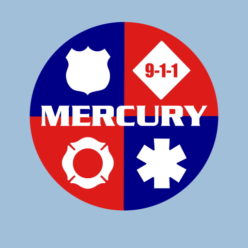The Mercury Critical Incident Response Team was established to provide a form of crisis intervention specifically designed to help emergency workers, corrections, and healthcare professionals cope with the psychological stresses inherent in their professions. Operational since 1984, the Mercury CISM Team provides critical incident stress management intervention for particularly stressful events such as multiple casualty incidents, the death of a child, the death of a co-worker, traumatic incidents involving critical media coverage, failure of rescue efforts following prolonged intervention, and other events that are unusually emotionally stressful.
On-duty team coordinators receive and screen requests for services. When the need for a CISM intervention is determined, the team coordinator contacts one or more team members as needed for the requested intervention. A CISM team member mental health provider will be required for all debriefings, line of duty deaths, and may be included on other incidents as deemed appropriate by the team coordinator. Debriefings will generally last one-two hours. Travel time may vary considerably. The Mercury CISM team consists of approximately 40 members who rotate to activation on the basis of intervention needs and availability. Other factors considered in assigning a team member include the type of service organization the individual represents and not being familiar with the individuals involved.
The volume of intervention varies from month to month. Other team member responsibilities include attending bi-monthly CISM team meetings. Members are required to attend at least four team meetings annually. The purpose of these meetings includes:
1. Providing continuing education programs
2. Review of activations each month
3. Providing an opportunity for members to get to know each other before working together during an intervention
4. Increasing team cohesion
5. Providing a forum for the exchange of ideas, the addressing of problems, and brainstorming
6. Addressing CISM business, current events, funding issues
7. PASS (post-action staff support)
Members may be asked to serve on committees and special task groups. They are also assigned to present pre-incident education programs to groups as requested. Education regarding critical incident stress is the first step in efficient utilization of the CISM process. Prospective team members are asked to complete and Application Form and a Memo of Understanding. They are requested to make a one-year commitment of service with the team. Prior to activation, team members must attend Group Crisis Intervention and Individual Crisis Intervention on Peer Support courses. Both courses are required for team members within one year of team membership.
If you have questions regarding membership on the Mercury CISM team please contact dispatch or the on-call coordinator and request to talk with someone regarding training and membership.
